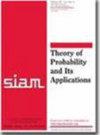On Complete Convergence of Moments in Exact Asymptotics under Normal Approximation
IF 0.6
4区 数学
Q4 STATISTICS & PROBABILITY
引用次数: 0
Abstract
Theory of Probability &Its Applications, Volume 68, Issue 4, Page 622-629, February 2024.For the sums of the form $\overline I_s(\varepsilon) = \sum_{n\geqslant 1} n^{s-r/2}\mathbf{E}|S_n|^r\,\mathbf I[|S_n|\geqslant \varepsilon\,n^\gamma]$, where $S_n = X_1 +\dots + X_n$, $X_n$, $n\geqslant 1$, is a sequence of independent and identically distributed random variables (r.v.'s) $s+1 \geqslant 0$, $r\geqslant 0$, $\gamma>1/2$, and $\varepsilon>0$, new results on their behavior are provided. As an example, we obtain the following generalization of Heyde's result [J. Appl. Probab., 12 (1975), pp. 173--175]: for any $r\geqslant 0$, $\lim_{\varepsilon\searrow 0}\varepsilon^{2}\sum_{n\geqslant 1} n^{-r/2} \mathbf{E}|S_n|^r\,\mathbf I[|S_n|\geqslant \varepsilon\, n] =\mathbf{E} |\xi|^{r+2}$ if and only if $\mathbf{E} X=0$ and $\mathbf{E} X^2=1$, and also $\mathbf{E}|X|^{2+r/2}<\infty$ if $r < 4$, $\mathbf{E}|X|^r<\infty$ if $r>4$, and $\mathbf{E} X^4 \ln{(1+|X|)}<\infty$ if $r=4$. Here, $\xi$ is a standard Gaussian r.v.
论正态逼近下精确渐近的矩完全收敛性
Theory of Probability &Its Applications, Volume 68, Issue 4, Page 622-629, February 2024. 对于和的形式 $\overline I_s(\varepsilon) = \sum_{n\geqslant 1} n^{s-r/2}\mathbf{E}|S_n|^r\,\mathbf I[|S_n|\geqslant \varepsilon\、n^\gamma]$,其中 $S_n = X_1 +\dots + X_n$,$X_n$,$n\geqslant 1$,是一串独立且同分布的随机变量(r.v.'s) $s+1 \geqslant 0$、$r\geqslant 0$、$\gamma>1/2$ 和 $/varepsilon>0$,提供了关于它们行为的新结果。例如,我们得到了海德结果的以下概括[J. Appl、12 (1975), pp. 173--175]: 对于任意 $r\geqslant 0$, $\lim_{varepsilon\searrow 0}\varepsilon^{2}\sum_{n\geqslant 1} n^{-r/2} \mathbf{E}|S_n|^r\,\mathbf I[|S_n|\geqslant \varepsilon\, n] =\mathbf{E}|\xi|^{r+2}$ if and only if $\mathbf{E}X=0$ 和 $\mathbf{E}X^2=1$, and also $\mathbf{E}|X|^{2+r/2}<\infty$ if $r < 4$, $\mathbf{E}|X|^r<\infty$ if $r>4$, and $\mathbf{E}X^4 \ln{(1+|X|)}<\infty$ (如果 $r=4$)。这里,$\xi$ 是标准高斯r.v.
本文章由计算机程序翻译,如有差异,请以英文原文为准。
求助全文
约1分钟内获得全文
求助全文
来源期刊

Theory of Probability and its Applications
数学-统计学与概率论
CiteScore
1.00
自引率
16.70%
发文量
54
审稿时长
6 months
期刊介绍:
Theory of Probability and Its Applications (TVP) accepts original articles and communications on the theory of probability, general problems of mathematical statistics, and applications of the theory of probability to natural science and technology. Articles of the latter type will be accepted only if the mathematical methods applied are essentially new.
 求助内容:
求助内容: 应助结果提醒方式:
应助结果提醒方式:


